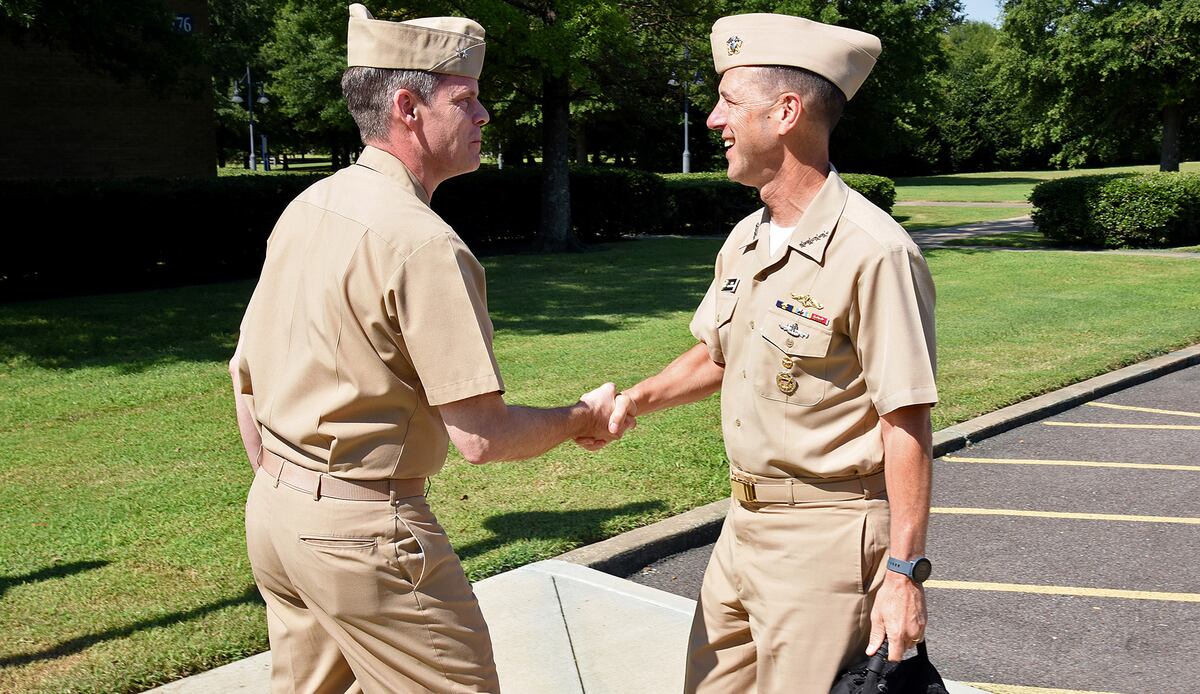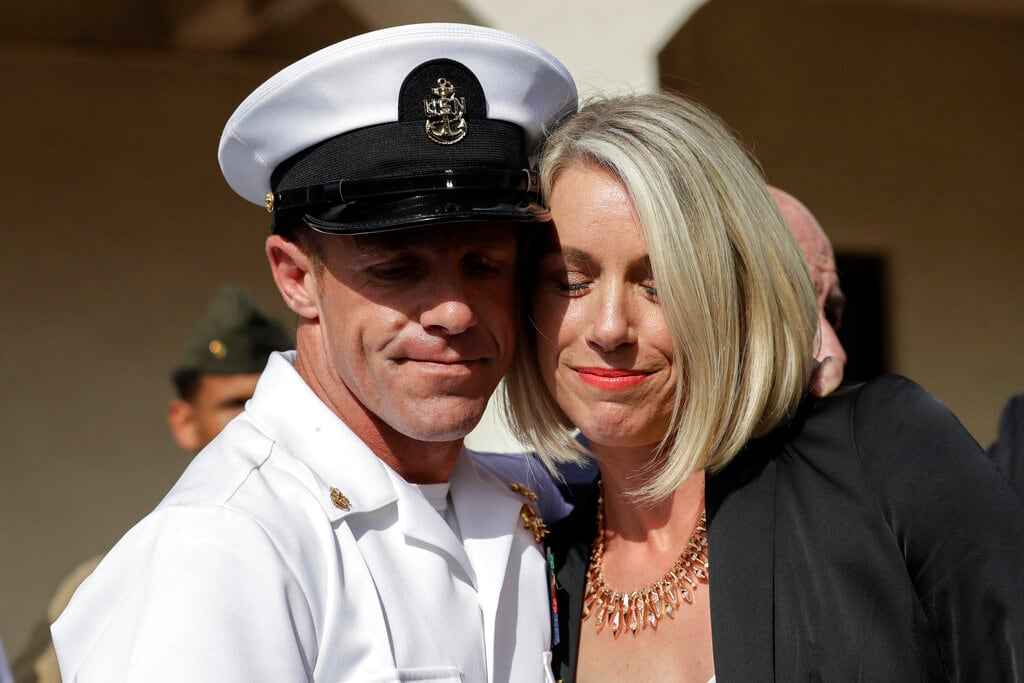In a stunning move Saturday, Chief of Naval Operations Adm. John Richardson removed all court-martial authority from Navy Region Southwest in the case involving Special Warfare Operator Chief Edward “Eddie” Gallagher.
“He will assume responsibility for any disposition action in the trial. Any previous post-trial action has been rescinded,” read a statement emailed to Navy Times by the Pentagon.
Richardson’s removal of Rear Adm. Bette Bolivar as the convening authority does not change the July 2 verdict by a military panel of Gallagher’s peers.
Although Gallagher was charged with stabbing to death a wounded Islamic State prisoner near the Iraqi city of Mosul in 2017 and also firing his sniper rifle at civilians and trying to cover up war crimes back home, the court-martial panel rejected the accusations and found him guilty only of one charge related to posing in photos with the detainee’s dead body.
CNO’s assertion of jurisdiction over Gallagher’s case came only two days after he ordered authorities in San Diego to dismiss all charges against Lt. Jacob X. “Jake” Portier, the officer in charge of Gallagher’s Alpha Platoon, SEAL Team 7, in Iraq.
Portier had been charged with helping Gallagher cover up alleged crimes which the military jury said never happened. Gallagher never disputed that he appeared in the photos, only noting that he wasn’t the only service member posing with the corpse.
The military panel in Gallagher’s court-martial case recommended a sentence that included four months behind bars and a reduction in grade to petty officer first class, but Gallagher already had served twice as many months in pretrial confinement.
And similar cases involving service members and photos of prisoners of war — dead or alive — often were resolved with non-judicial punishment, not a general court-martial that automatically would reduce him to the pay grade of E-1.
In the military, the flag officer who convenes a court-martial gets a final say on the sentencing. Gallagher’s civilian defense attorney, Timothy Parlatore, urged her to let the highly decorated Gallagher retire as a chief petty officer after two decades of service.
For now, Gallagher’s pay grade is officially petty officer first class. Although Bolivar had not signed or certified the verdict, he was automatically reduced after 14 days and Naval Special Warfare contacted him so that he could report in the correct uniform, officials told Navy Times.
Now Richardson gets to make the call on whether he’s permanently an SO1 or, following the regulations, busted down to the lowest enlisted rating.
“Chief Gallagher is grateful that the CNO is exercising his authority over this case,” said Parlatore. “Adm. Richardson demonstrated great judgment and leadership in his resolution of the Portier case. And our fervent hope is that this will help expedite us to our ultimate desired goal — for the harassment and retaliation to end and for Chief Gallagher to retire as a chief petty officer.”
Parlatore, ace litigator Marc Mukasey and other members of Gallagher’s legal team had become concerned that problems within Naval Special Warfare, San Diego’s Regional Legal Service Office and Bolivar’s command might affect the SEAL’s sentencing, a sentiment that seemed to be increasingly shared by the CNO and his top boss, President Donald J. Trump.
RELATED

On Wednesday, a tweeting Trump announced that he ordered CNO and Secretary of the Navy Richard V. Spencer to nix the Navy Achievement Medals bestowed on four of Gallagher’s prosecutors by Regional Legal Service Office Southwest’s commanding officer — Capt. Meg Larrea — in a special ceremony overseen by Capt. Gary E. Sharp, the chief of staff of Naval Legal Services Command in Washington.
Their decorations raised eyebrows because although those Navy attorneys weren’t found culpable of wrongdoing during the case against Gallagher, their prosecution team was sanctioned by Navy judge Capt. Aaron Rugh for violating the SEAL’s constitutional rights.
Part of the sanctions against the team included booting Cmdr. Christopher Czaplak, the lead prosecutor, for a warrantless surveillance program cooked up with Naval Criminal Investigative Service agents to track emails sent by defense attorneys and Navy Times.
And the spying wasn’t the only allegation of prosecutorial and police misconduct dogging the case.
They were accused of manipulating witness statements to NCIS agents; using immunity grants and a bogus “target letter” in a crude attempt to keep pro-Gallagher witnesses from testifying; illegally leaking documents to the media to taint the military jury pool; and then trying to cover it all up when they got caught.
In the wake of the Gallagher verdict, on Thursday Richardson ordered Vice Chief of Naval Operations Adm. Bob Burke to conduct a comprehensive review into the performance of all Navy Judge Advocate General leaders.
RELATED

It’s unclear if CNO’s latest order stemmed from a debacle in San Diego on Friday.
Richardson’s Thursday mandate appeared unambiguous: “Chief of Naval Operations Adm. John Richardson today dismissed all charges in the case of Lt. Jacob Portier," read the statement.
But prosecutors the following morning said that they couldn’t actually withdraw the case. That forced Rugh to adjourn court until the afternoon, when he finally presided over the dismissal of charges.
Portier’s defense attorneys and other court observers told Navy Times that they were shocked Richardson’s direct and lawful wasn’t carried out immediately.
Later in the day, Parlatore reeled from a letter sent by Bolivar that seemed to telegraph her decision to strip Gallagher of his anchors.
She suggested that factors such as witness intimidation, interference with the administration of justice, the effect of deferment on the good order and discipline on the command and Gallagher’s character could be considered and that Parlatore’s plea for leniency “fails to satisfy” those concerns.
But to Gallagher’s legal team, Bolivar’s letter also seemed muddled.
Was she using charges that already had been tossed out by Gallagher’s jury to buttress a future sentence?
Or was she reacting to an often incendiary Instagram account helmed by Andrea Gallagher, the SEAL’s wife?
The social media account continues to lampoon the special operators who testified against her husband during the court-martial trial and the leaders at Naval Special Warfare who initially brought the case against him, but they are his spouse’s words.
Navy Region Southwest spokesman Brian O’Rourke assured Navy Times that Bolivar’s letter had nothing to do with the rejected charges in Gallagher’s court-martial case, but now he and the rest of his staff no longer have to deal with the headache.
Gallagher’s fate now rests in the hands of the CNO.
Prine came to Navy Times after stints at the San Diego Union-Tribune and Pittsburgh Tribune-Review. He served in the Marine Corps and the Pennsylvania Army National Guard. His awards include the Joseph Galloway Award for Distinguished Reporting on the military, a first prize from Investigative Reporters & Editors and the Combat Infantryman Badge.









